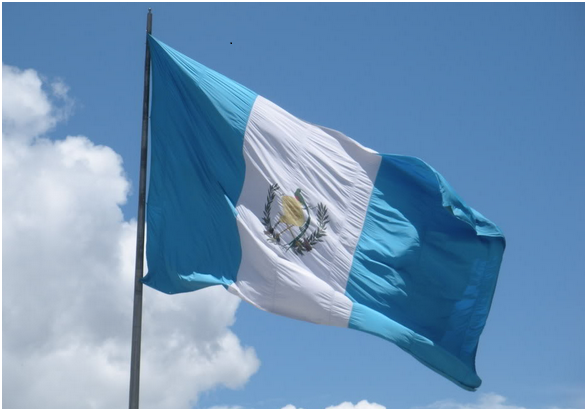
Nov 16, 2017 | Artículos, Noticias
Communicado de la CIJ, ante la visita de Alto Comisionado de las Naciones Unidas para los Derechos Humanos Sr. Zeid Ra´ad Al Hussein a Guatemala.
La CIJ expresó:
1. El país se encuentra en una de las más graves crisis institucionales que se han presentado en la época post-conflicto armado interno. Desde el 27 de agosto, cuando el Presidente de la República declaró persona non grata al Comisionado de la Comisión Internacional contra la Impunidad (CICIG), quedó evidenciado que el Organismo Ejecutivo, al más alto nivel, iniciaba una serie de actos arbitrarios, para afectar el desenvolvimiento de este organismo de las Naciones Unidas.
2. Por su parte, el Congreso de la República, inició la implementación de una “Agenda Legislativa a favor de la Impunidad”, por medio de la aprobación de una ley de reformas al Código Penal, que luego, ante el rechazo generalizado de la población guatemalteca, tuvo que dar marcha atrás.
3. En las últimas semanas, el Congreso de la República, en forma abierta, ha evidenciado que la “Agenda Legislativa a favor de la Impunidad” tiene como pilares fundamentales: a) Facilitar la corrupción por medio de iniciativas tales como eliminar la constancia de “finiquito” o constancia de haber cumplido con todas las normas relativas a la transparencia, para quienes quieran optar al cargo público de diputado o diputada; b) Consagrar la Impunidad en casos de Justicia Transicional a favor de militares acusados de graves violaciones a los derechos humanos cometidas durante el conflicto armado interno, por medio del otorgamiento de una “amnistía general”, y reformas a la Ley de Reconciliación Nacional; c) Reprimir a quienes ejercen el derecho a la resistencia pacífica, así como afectar el normal funcionamiento de las Organizaciones No Gubernamentales, por medio de leyes, que permitirán establecer mayores controles al funcionamiento de las ONGs y desarrollar aún más, la persecución a dirigentes comunitarios, por medio de la Ley contra actos terroristas.
4. Mientras tanto, las y los jueces independientes y honestos del Poder Judicial, continúan sufriendo campañas de difamación, recusaciones infundadas para ser apartados de los casos de alto impacto que conocen; litigio de mala fe por parte de abogados y abogadas que defienden a funcionarios públicos en casos de corrupción que se ventilan en su contra; ataques por medio de medidas disciplinarias y hasta ataques fìsicos.
5. La CIJ ha podido constatar que el Sistema de Justicia tiene grandes retos que debe superar; sin embargo, para ello es necesario que se impulsen reformas que lo fortalezcan. Esas reformas se vuelven casi imposibles, cuando están en manos de funcionarios acusados de cometer delitos o actos de corrupción. Un claro ejemplo, lo constituye la figura jurídica del antejuicio, que según las reformas constitucionales debería desaparecer para el caso de muchos funcionarios públicos. Sin embargo, precisamente fue el Congreso de la República, quien rechazó esta reforma en forma tajante.
6. El próximo año 2018 se iniciará con la crucial elección de Fiscal General. Como lo expresara la CIJ en su comunicado del mes de febrero del presente año, la existencia de un pacto de impunidad, hacía prever acciones concretas en contra de la CICIG y su representante en el futuro inmediato.
7. LA CIJ considera que si en dicha elección el crimen organizado toma el control de esta institución, significará que las estructuras criminales habrán consolidado el Pacto de Impunidad que pretenden implementar, para lograr que los casos de alto impacto que hoy se ventilan ante los tribunales de justicia, se vean seriamente afectados, incluso con la liberación de las personas que se encuentran guardando prisión.
8. En lo que respecta a la obligación del Estado de Guatemala de respetar los derechos humanos de las personas, la CIJ considera que la visita del señor Al Hussein se lleva a cabo en un clima de inseguridad y ataques contra defensores y defensoras de derechos humanos, contra los Pueblos Indígenas y campesinos pobres de Guatemala, imperando acciones estatales de racismo, exclusión y discriminación.
Ante esta crisis institucional, que afecta a los tres organismos del Estado y a la sociedad guatemalteca en su conjunto, Ramón Cadena, Director de la Comisión Internacional de Juristas para Centroamérica expresó:
“La oficina del Alto Comisionado de las Naciones Unidas para los Derechos Humanos (OACNUDH), debe asumir en esta visita, la posición más contundente posible, para obtener de las autoridades del Estado de Guatemala, compromisos concretos, viables y verificables, para construir un verdadero Estado de Derecho, en el que se respeten los derechos humanos de todos los pueblos.”
Guatemala, 16 de noviembre de 2017
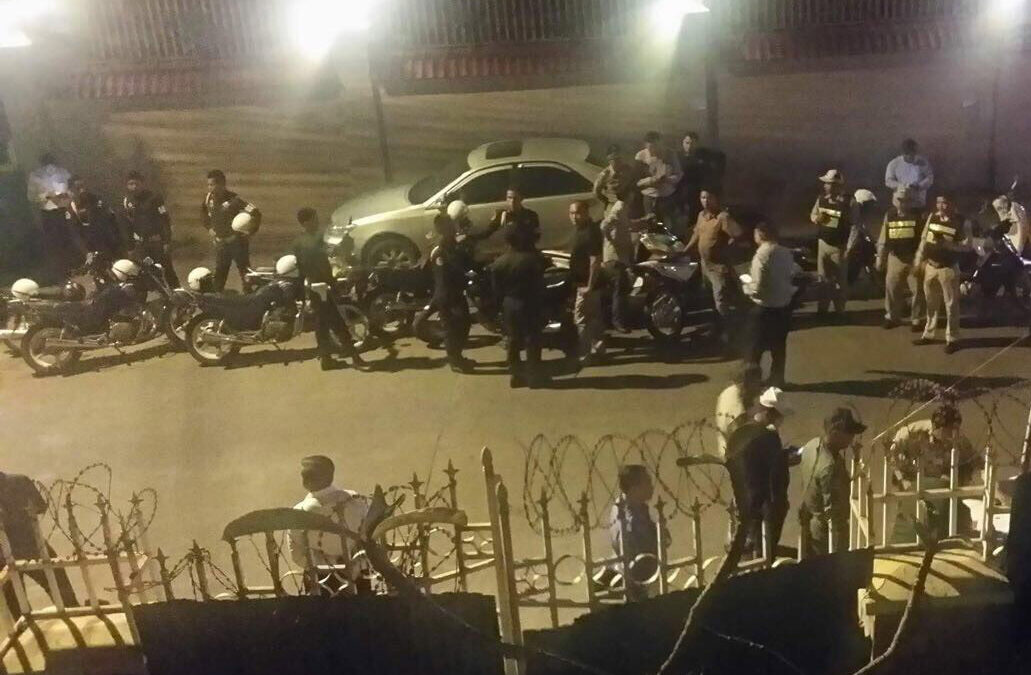
Nov 16, 2017 | News
Today’s decision of the Supreme Court to dissolve the main opposition political party, the Cambodia National Rescue Party (CNRP), has significantly heightened the human rights and rule of law crisis within the country, the ICJ said.
The Supreme Court has also banned 118 of CNRP politicians from political activity for five years.
“By dissolving the main opposition party and banning 118 CNRP politicians from political activity for five years, the Supreme Court is irreparably interfering with the rights of potentially millions of Cambodians to freely choose their political representatives and vote for them in the upcoming elections,” said Kingsley Abbott, the ICJ’s Senior International Legal Adviser for Southeast Asia.
“The fact that the Law on Political Parties was amended to enable the Supreme Court to dissolve political parties shortly before it dissolved the CNRP strongly suggests the entire ‘legal process’ was nothing more than political theatre, inconsistent with human rights and the rule of law.”
A full bench of nine judges of the Supreme Court, including the President, unanimously decided to dissolve the CNRP pursuant to powers contained within Article 44 (new) of the Law on Political Parties (LPP), which was controversially amended twice this year, in February and July 2017.
The lawyers representing the CNRP were not present at Court after electing to boycott the proceedings in protest at their legitimacy.
Furthermore, the President of the Supreme Court, Justice Dith Munty, who read out the decision, is reportedly a member of the ruling Cambodian People’s Party (CPP) and sits on both its Standing and Permanent Committees, raising serious doubts about the independence and impartiality of the Court.
“It makes a mockery of fair justice to have someone in a leadership position within one political party sit in judgment on the conduct of that party’s main opposition. There can be no starker example of an inherent conflict of interest,” Abbott said.
“At an absolute minimum, the President should have recused himself from any role in relation to the case, as should have any other judge sitting on the bench if they hold a similar position within the CPP,” he added.
These concerns are consistent with the ICJ’s findings in a report it released last month, in which it found that the “single largest problem facing the Cambodian justice system is the lack of independent and impartial judges and prosecutors.”
“The problem is two-fold: an endemic system of political interference in high-profile cases and an equally entrenched system of corruption in all others.”
On 23 October 2017, the 26th anniversary of the 1991 Paris Peace Conference on Cambodia, the ICJ and 54 other organizations wrote an open letter to the Secretary-General of the United Nations and the Conference’s co-chairs calling on them to reconvene the members of the Conference, along with other concerned stakeholders, for an emergency summit to discuss the human rights crisis within the country.
“The dissolution of the CNRP sends a strong signal to the international community and all Cambodians that a red-line has been crossed, which makes reconvening the Paris Peace Conference to address the human rights and rule of law crisis within the country all the more urgent,” said Kingsley Abbott.
Contact
Kingsley Abbott, Senior International Legal Adviser for Southeast Asia, ICJ, t: +66 94 470 1345 ; e: kingsley.abbott@icj.org
Background
It has been reported that, on 4 and 5 October 2017, the Cambodia Youth Party and the Funcinpec Party, respectively, filed complaints with the Ministry of Interior (MOI) alleging that the CNRP had violated Articles 6 (new) and 7 (new) of the Law on Political Parties, and asked the MOI to file a complaint with the Supreme Court to dissolve the CNRP.
On 6 October 2017, the MOI filed a complaint with the Supreme Court pursuant to Article 38 (new) of the LPP to dissolve the CNRP.
Article 25 of the International Covenant on Civil and Political Rights (ICCPR), to which Cambodia is a State Party, guarantees the rights of all persons, without any unreasonable restrictions, “to take part in the conduct of public affairs, directly or through freely chosen representatives; and to vote and to be elected at genuine periodic elections which shall be by universal and equal suffrage and shall be held by secret ballot, guaranteeing the free expression of the will of the electors.”
Article 14 of the ICCPR affirms the principle that tribunals judging rights and obligations in legal proceedings be independent and impartial.
Detailed international standards on requirements for a court to be independent have been set out in the UN Basic Principles on the Independence of the Judiciary (1985), and requirements for judicial impartiality have been set out in the Bangalore Principles of Judicial Conduct and Commentary (2002/2007), which includes the standard that “All partisan political activity and association should cease upon the assumption of judicial office” (para 75 of the Commentary).
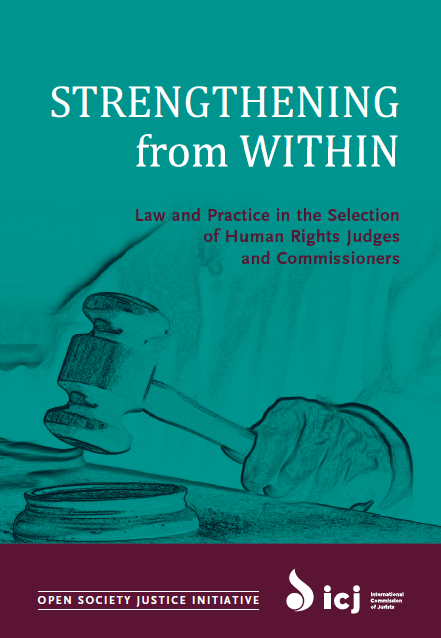
Nov 16, 2017 | Artículos, Informes, Noticias, Publicaciones
Los procedimientos nacionales para la selección de los jueces de los tribunales regionales de derechos humanos frecuentemente no cumplen con los estándares de imparcialidad, inclusión y transparencia, concluye un informe conjunto de OSJI y de la CIJ publicado hoy.
Universal-Fortaleciendo desde Dentro-Publications-Reports-2017-SPA (el informe en español, PDF)
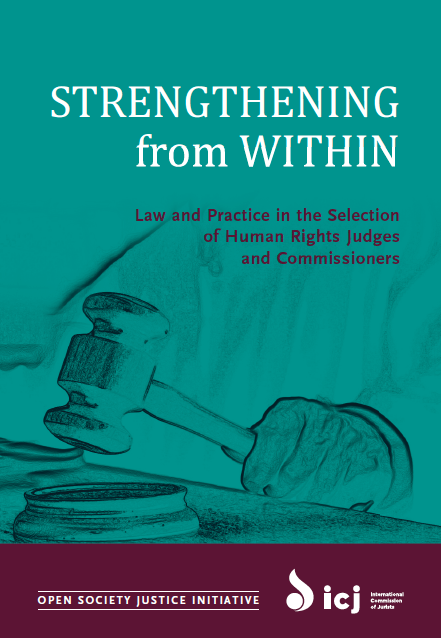
Nov 16, 2017 | Articles, Nouvelles, Publications, Rapports
Les procédures nationales de sélection pour les magistrats des cours régionales des droits de l’Homme ne respectent que trop rarement les standards d’équité, d’intégration et de transparence, selon les conclusions d’un rapport publié aujourd’hui par la CIJ et l’Open Society Justice Initiative.
Ce rapport fait des recommandations visant à assurer la sélection des meilleurs candidats comme magistrats des cours régionales des droits de l’Homme.
Les cours et commissions régionales des droits de l’Homme, y compris la Cour africaine des droits de l’Homme et des peuples, la Cour européenne des droits de l’Homme et la Commission interaméricaine des droits de l’Homme, sont des défenseurs essentiels de l’état de droit.
Pourtant, malgré leur importance, le processus de sélection des magistrats et commissaires qui siègent dans ces organes, c’est-à-dire la façon dont ils sont nominés, contrôlés et in fine sélectionnés, demeure largement inconnu et bien souvent organisé de manière opaque.
Associée à des efforts politiques répétés pour éroder les institutions de droits internationaux, cette opacité souligne le besoin crucial de se concentrer sur le renforcement de ces systèmes depuis l’intérieur.
Ce rapport, consolidé depuis l’intérieur, répond justement à ce défi.
Il met en lumière les processus qu’utilisent les Etats pour nominer et sélectionner les magistrats et commissaires des droits de l’Homme.
En analysant les pratiques de nominations de 22 pays, ce rapport documente la façon dont les procédures de nominations ne respectent pas assez souvent les cadres légaux et les standards internationaux qui seraient censés les guider.
Ce rapport identifie également les pratiques prometteuses et propose des recommandations fondées sur l’expérience.
Un pouvoir judiciaire indépendant est essentiel à l’état de droit: pour les cours nationales, les procédures de sélection du pouvoir judiciaire doivent être équitables, transparentes et basées sur le mérite.
Ainsi que que le fait remarquer ce rapport, les cours et tribunaux internationaux du monde entier sont à la même enseigne.
Universal-Strengthening from Within-Publications-Reports-2017-FRA (rapport complet en français, PDF)
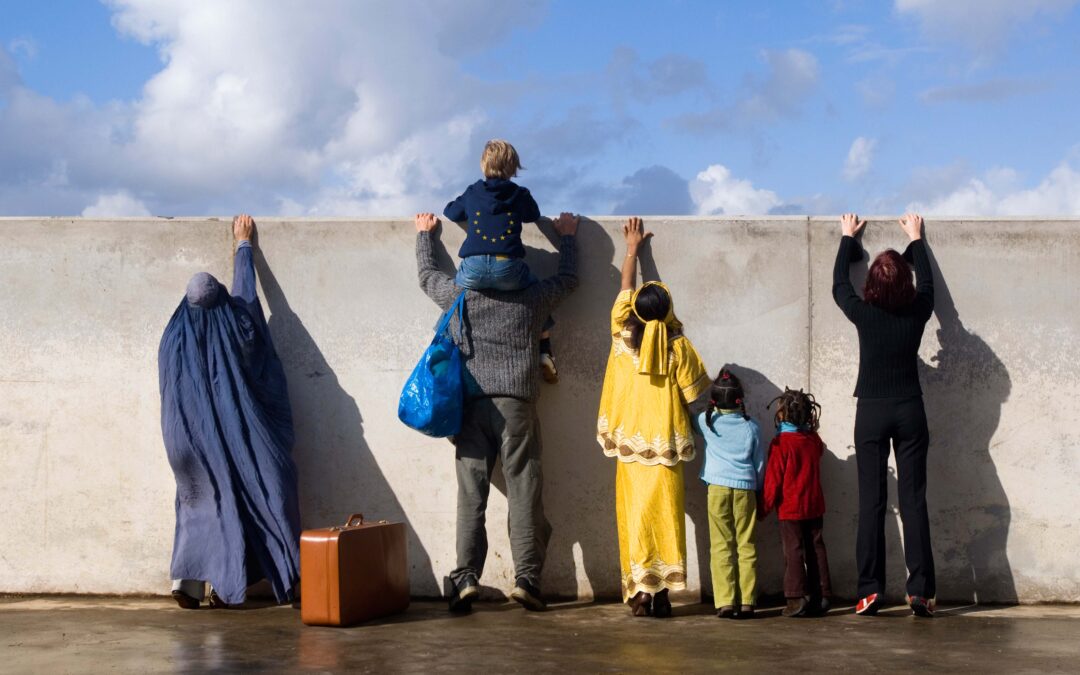
Nov 11, 2017 | Agendas, Events
Today begins in Istanbul (Turkey) a two-day training for lawyers and CSO practitioners representing and working with migrants, refugees and asylum-seekers.
This event is organized by ICJ, in cooperation with its partners Refugee Rights Turkey, the European Council on Refugees and Exiles (ECRE), Mülteci-Der (MD) and ICJ-EI, as part of the EU co-financed project Fostering Access to Rights for Migrants, Refugees and Asylum-Seekers in Turkey.
30 lawyers and civil society practitioners – representing nine different bar associations and relevant organisations from the Istanbul area and other nearby key migration and asylum locations – are taking part in the training on 11 and 12 November.
The training aims to update lawyers and CSOs on the international and national law on the rights of refugees, migrants and asylum-seekers in order to be effective in their work at both the national and international levels. It aims at an effective implementation of the Turkish legal framework on asylum and migration.
The main thematic areas to be discussed will be the principle of non-refoulement, international protection, detention and access to economic, social and cultural rights.
The training will use as a basis the draft training materials prepared by the ICJ and its partners (to be published an the end of 2019) and, among other sources, the ICJ Practitioners Guide no. 6: Migration and International Human Rights Law.
The project “Fostering Access to Rights for Migrants, Refugees and Asylum-Seekers in Turkey” is funded by the European Instrument for Democracy and Human Rights (EIDHR) of the European Union.
Turkey-Training-Agenda-MigrationAsylumIHRL-Istanbul-2017-eng (download the agenda)








